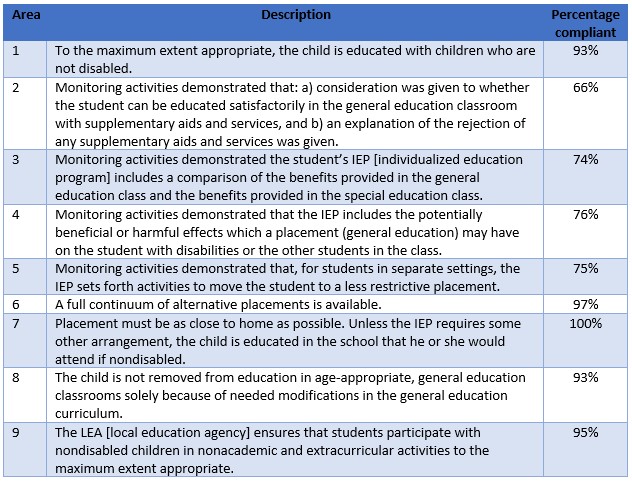EDUCATION IN THE LEAST RESTRICTIVE ENVIRONMENT: HOW ARE NJ SCHOOL DISTRICTS DOING?
Five years after entering into a ground-breaking settlement with leading disability rights advocates, the New Jersey Department of Education (NJDOE) has issued final reports to 76 school districts on their compliance with the requirement to educate students with disabilities in the “least restrictive environment” (LRE).
LRE is a key provision of the federal Individuals with Disabilities Act (IDEA), intended to ensure that states and school districts make every effort to educate students with disabilities in classrooms alongside their non-disabled peers.
Education Law Center (ELC), Disability Rights New Jersey (DRNJ), the Statewide Parent Advocacy Network of New Jersey (SPAN), and the ARC of New Jersey sued the NJDOE in 2007, alleging that special education students in the 76 districts were disproportionately and unnecessarily placed in out-of-district, segregated programs. The lawsuit also alleged districts failed to provide students with in-class supports, services and other accommodations required for an appropriate education in general education classrooms.
As part of the 2014 settlement agreement, the NJDOE was required to conduct annual compliance monitoring of each district in nine areas identified in state special education regulations. These areas are essential components of the LRE requirement for special education students.
The NJDOE issued the final monitoring reports required by the settlement agreement to each of the 76 districts between December 2018 and July 2019. Those reports provided the school districts with findings of noncompliance in the nine areas, identification of corrective action and a timeline to remedy noncompliance.
ELC’s analysis of the final compliance reports found that the majority of school districts have successfully addressed concerns outlined in the lawsuit. Of the 76 school districts monitored, 46 are now compliant in all nine areas, four are compliant in eight areas, and five are compliant in seven areas.
Yet, the NJDOE found 21 districts remain noncompliant in three or more areas. Of those, six districts are noncompliant in three areas, 10 districts are noncompliant in four areas, four districts are noncompliant in five areas and one district is noncompliant in seven areas. For a list of the 76 districts and how they fared during final monitoring, click here.
ELC’s summary of the compliance results is below:

All 76 districts are meeting the requirement in Area 7, which ensures students are educated in the same schools they would attend if they did not have disabilities. More than 90% of districts are also meeting actions required by Areas 1, 8, and 9, regarding opportunities for special education students to participate in academic, nonacademic and extracurricular activities with typical students. Districts are also meeting the requirement in Area 6 of offering a full range of alternative placements to students and their families.
But districts are still struggling with compliance in Area 2 regarding the use of supplementary aids and services to support special education students in general education classrooms. It is clear that some districts are not giving enough thought to how to make a less restrictive placement work and/or failing to explain why success in a general education classroom cannot be achieved by using supplementary aids and services.
The NJDOE’s final monitoring reports included directives to address all areas of noncompliance. Districts were instructed, for example, to conduct training for staff, develop oversight mechanisms, and correct individual instances of noncompliance.
“The settlement agreement expired with completion of the final monitoring reports, but districts remain legally obligated to comply with the LRE mandate and the NJDOE’s directives for corrective action,” said Elizabeth Athos, ELC senior attorney. “We’re asking parents to alert ELC and DRNJ about any violations. We remain steadfast in enforcing the right of students with disabilities to be educated in the LRE.”
“Overall, the settlement agreement has had a positive impact, improving inclusion opportunities in the designated districts,” said Mary Ciccone, DRNJ attorney and member of the Stakeholder Committee that provided feedback on settlement implementation. “While progress has been made, New Jersey schools still have a long way to go to be fully inclusive of students with disabilities.”
Related Story:
Press Contact:
Sharon Krengel
Policy and Outreach Director
skrengel@edlawcenter.org
973-624-1815, x 24
Press Contact:
Sharon Krengel
Director of Policy, Strategic Partnerships and Communications
skrengel@edlawcenter.org
973-624-1815, x240